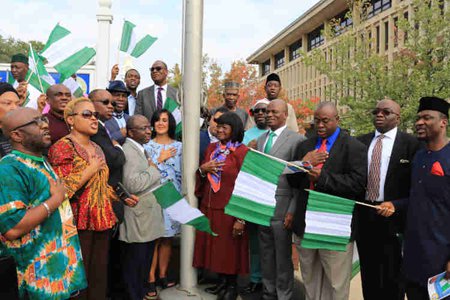Corrupt politicians use looted funds in votes buying during elections- Buhari

Mathew Dadiya, Abuja
President Muhammadu Buhari has said that illicit funds were mostly used in the 2019 February/March general elections in buying votes.
The President however warned that the growing trend of monetary inducement during elections would have dire consequences on the polity, if not checked.
Buhari said this on Tuesday in Abuja at the National Democracy Day Anti-Corruption Summit, organised by the Economic and Financial Crimes Commission (EFCC), with its theme: “Curbing Electoral Spending: A Panacea for Public Corruption”.
He also argued that the dangers were that the influence of money may on the long run subvert free choices by voters and allows unprincipled individuals to gain access to leadership positions.
The Nigerian leader regretted that the recent political experiences have been characterised by the corrupting influence of money on party politics and electioneering processes.
“This unwholesome practice has dire consequences on our nations, in subverting the exercise of free choice by voters, elevated corrupt and unprincipled individuals to positions of leadership and entrenching the structures of democracy devoid of accountability,” he added.
While trying to buttress the ills of vote buying, he said electoral spending manifests in different forms, hence steps should be taken to de-commercialise the political process so that true democracy can survive and thrive.
Buhari noted that even though the country was not in short supply of legal frameworks to combat reckless electoral spending; the provision of Section 90 of the Electoral Act, 2010 (As Amended) explicitly puts a cap on the amount candidates for different political offices must expend on elections, failing which they are violating the law.
The speaking further, the President said: “Of greater significance is the provision of section 88 of the Act which prohibits a political party in Nigeria from ‘possessing any fund outside or retaining funds or other assets remitted to it from outside Nigeria’.
“The philosophical underpinning of the above provisions and other related provisions of the Act is to prevent desperate politicians from buying their ways into political offices at the expense of low – spending law-abiding individuals”.
At the event attended by the President of Rwanda, Paul Kagame, including famous anti-corruption advocate, Professor Patrick Lumumba, Buhari said going forward, his administration would unveil stern measures aimed at curbing corruption, part of which will involve abolishing of bank secrecy jurisdictions and crackdown of safe tax havens for corrupt assets.
While giving an insight into how he intends to fight corruption in his second term, Buhari said he would strengthen the capacity of the Economic and Financial Crimes Commission and other anti-corruption agencies by providing additional material, organisational and logistical support.
This would also involve closing existing legislative loopholes, facilitating collaboration with the judiciary, and strengthening criminal justice system.
Other measures the presidency would adopt includes enforcement of effective asset declaration by public office holders, ensure sanctions by professional bodies against lawyers, bankers, brokers, public officials, as well as individuals facilitating corrupt practices.
“We would ensure comprehensive support and protection to whistleblowers, witnesses and victims of corruption; adopt and formulate the policy of ‘naming and shaming’ all those who engage in corrupt practices while encouraging and honouring those who do not.
“This would also include educating, mobilising and encouraging Nigerians at the grassroots level to take ownership of the fight against corruption, while insisting on the unconditional return of looted assets kept abroad and further strengthening of international cooperation through information and mutual legal assistance,” Buhari stressed in his address at the summit.








